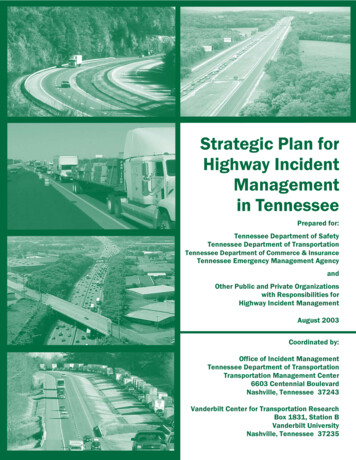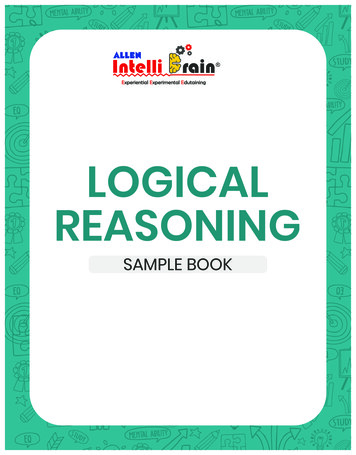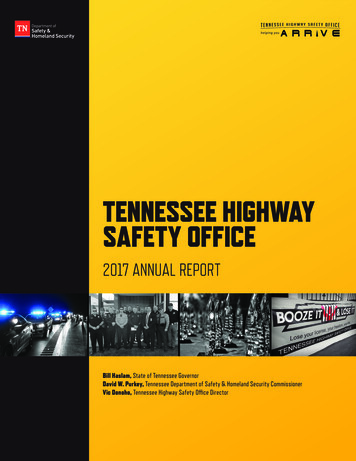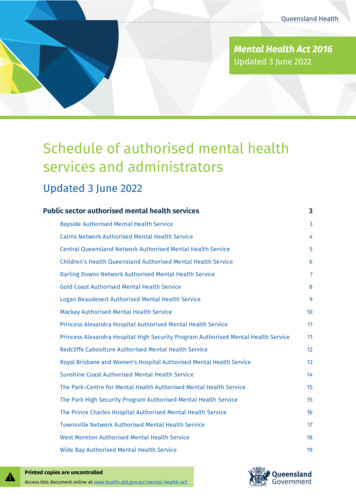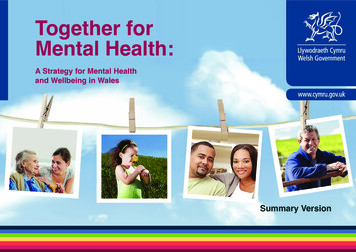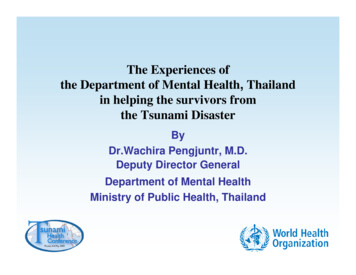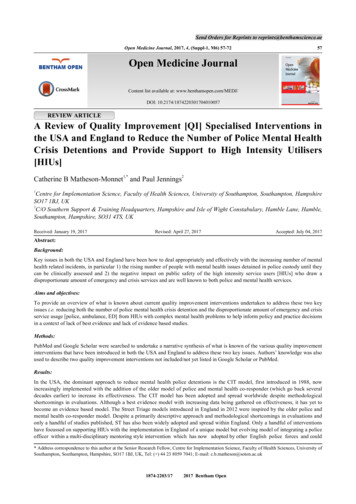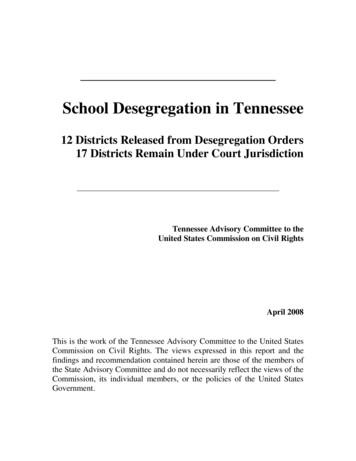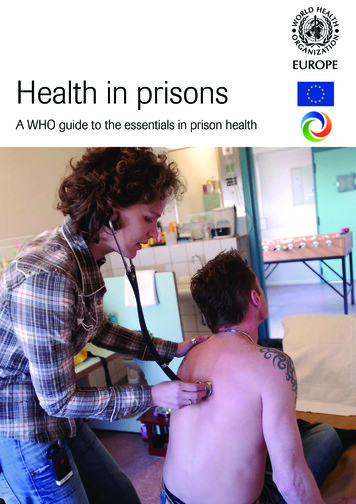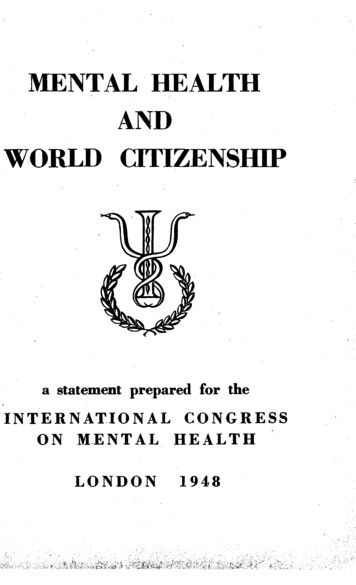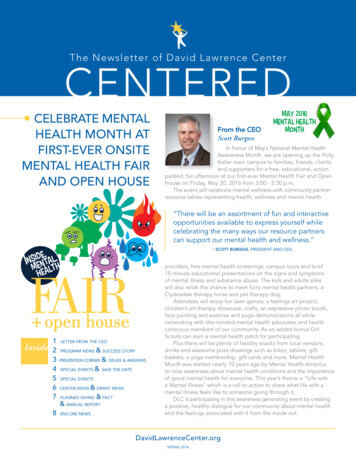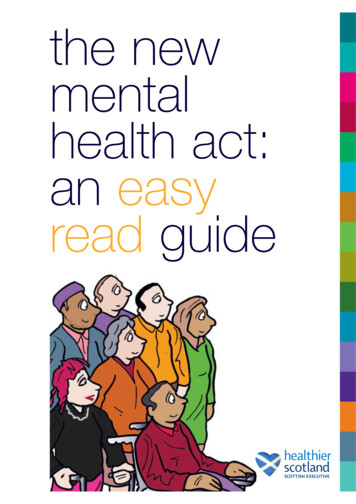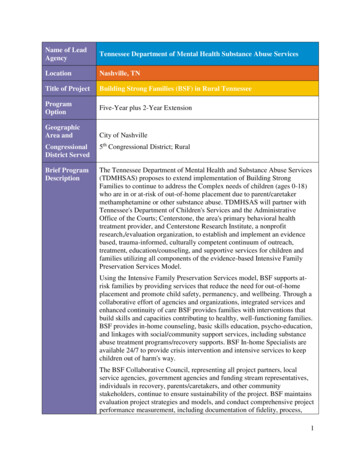
Transcription
Name of LeadAgencyTennessee Department of Mental Health Substance Abuse ServicesLocationNashville, TNTitle of ProjectBuilding Strong Families (BSF) in Rural TennesseeProgramOptionFive-Year plus 2-Year ExtensionGeographicArea andCity of NashvilleCongressionalDistrict Served5th Congressional District; RuralBrief ProgramDescriptionThe Tennessee Department of Mental Health and Substance Abuse Services(TDMHSAS) proposes to extend implementation of Building StrongFamilies to continue to address the Complex needs of children (ages 0-18)who are in or at-risk of out-of-home placement due to parent/caretakermethamphetamine or other substance abuse. TDMHSAS will partner withTennessee's Department of Children's Services and the AdministrativeOffice of the Courts; Centerstone, the area's primary behavioral healthtreatment provider, and Centerstone Research Institute, a nonprofitresearch,/evaluation organization, to establish and implement an evidencebased, trauma-informed, culturally competent continuum of outreach,treatment, education/counseling, and supportive services for children andfamilies utilizing all components of the evidence-based Intensive FamilyPreservation Services Model.Using the Intensive Family Preservation Services model, BSF supports atrisk families by providing services that reduce the need for out-of-homeplacement and promote child safety, permanency, and wellbeing. Through acollaborative effort of agencies and organizations, integrated services andenhanced continuity of care BSF provides families with interventions thatbuild skills and capacities contributing to healthy, well-functioning families.BSF provides in-home counseling, basic skills education, psycho-education,and linkages with social/community support services, including substanceabuse treatment programs/recovery supports. BSF In-home Specialists areavailable 24/7 to provide crisis intervention and intensive services to keepchildren out of harm's way.The BSF Collaborative Council, representing all project partners, localservice agencies, government agencies and funding stream representatives,individuals in recovery, parents/caretakers, and other communitystakeholders, continue to ensure sustainability of the project. BSF maintainsevaluation project strategies and models, and conduct comprehensive projectperformance measurement, including documentation of fidelity, process,1
outcomes, cost effectiveness, and follow-up data, to develop and disseminatea thoroughly documented service model for replication across the state andnation.TargetPopulationChildren in/at risk of out of-home placement due to parent/ caretakersubstance abuse.ParticipantsServedChildren: 551Adults: 386Families: 267Major GoalsMajor program goals included:Goal I. Establish a Community-Based Treatment Program for Children andFamilies Objective A. Assemble a culturally competent team of clinical andoutreach staff with experience in substance abuse, behavioral healthcareand child welfareObjective B. Increase current capacity by 48 intensive familypreservation services slots each yearObjective C. Provide intensive home-based services unduplicated total of216 children/ familiesGoal II. Increase Community Awareness/Education Objective A. Develop and implement training module on METH andother substance abuse on child and family functioningObjective B. Educate/train 3000 foster parents, community lawenforcement officers, judges, physicians, nurses, social service workers,school personnel and other stakeholders in target countiesGoal III. Improve Outcomes of Children Related to Safety, Permanency andWell-Being Objective A. Safety. Increase in children at risk of removal due toparental drug use who are able to remain in parent’s custody throughsubstance abuse treatment completionObjective B. Safety Reduce recurrence of maltreatment within 6 monthsof previous filingObjective C. Permanency: Reduce length of stay in foster care ofchildren & improve time to reunification or adoption/ guardianship ofchildren removed due to parent’s substance abuseObjective D. Permanency Reduce re-entry into foster care of childrenwho have been reunified after parent’s substance abuse treatment2
Objective E. Well-being Increase children with needs assessed andconnected to appropriate servicesGoal IV. Improve Outcomes of Parents/Caregivers with Meth and SubstanceAbuse Problems Objective A: Increase assessment of parents’ substance abuse needs andconnection to treatmentObjective B: Increase parents’ completion of substance abuse treatmentObjective C. Increase parents who maintain abstinence for 3, 6, and 9months after completing treatmentObjective D. Increase parents connected to supportive services duringsubstance abuse treatmentObjective E: Increase parents participating in continuing care andrecovery servicesGoal V. Improve Outcomes of Families Objective A. : Increased parent’s capacity to provide for their children’sneeds, e.g., employment, job trainingObjective B. Decrease in risk factors: (a) parent’s criminal behaviorsrelated to manufacturing/ selling drugs, (b) parent’s mental healthsymptoms, and (c) child’s behavior and functioning problemsObjective C. Increase in protective factors such as resilience, parentingskills, social connections, etc.Objective D: Increase in families connection with services related toneeds in Permanency PlanObjective E.: Increase children and families (a) actively participating inintensive case planning, and (b) receiving coordinated case managementacross agenciesGoal VI. Improve Regional Partnership/Service Capacity Level Key MajorProgramServicesObjective B. Increased number of treatment programs and slots, andincreased families servedObjective C. Enhanced collaboration among partners through MOUsregarding treatment coordination and other collaborative activitiesGoal VII. Develop and Disseminate ModelObjective A. Conduct a comprehensive evaluationObjective B. Produce manuals, publication, presentation and otherproducts to promote dissemination/ replicationCase Management and Case Conferencing Intensive/Coordinated Case ManagementFamily Group Decision Making/Family Case Conferencing3
“Regular” or “Traditional” In-Home ServicesParenting/Family Strengthening Evidence-Based Parenting or Family Strengthening Program - IntensiveFamily Preservation ServicesFamily Therapy/CounselingMental Health and Trauma Services for Adults Mental Health ServicesTrauma-Informed ServicesSpecialized Outreach, Engagement and Retention Cognitive Behavioral Strategies - MotivationalInterviewing/Motivational Enhancement TherapySubstance Abuse Prevention Services Information DisseminationCommunity-Based ProcessScreening and Assessment – Child Welfare and Other Children’s Issues Screening and Assessment for Child Welfare IssuesScreening and Assessment for TraumaOther Specialized Child Screening and Assessment – MentalHealth/Psychological, Substance Use, DevelopmentalScreening and Assessment – Substance Use and Other Adult Issues Screening and Assessment for Substance Use DisordersOther Specialized Adult Screening and Assessment – Mental Health/CoOccurring DisordersCross-Systems Collaboration Clinical and Program TrainingRegular Joint Case Staffing MeetingsCross-systems Information Sharing and Data AnalysisPartner Meetings – Regional Partnership and Program ManagementOther PartnerAgencies andOrganizationsReferral and Linkage to Substance Abuse Treatment for AdultsReferrals and Linkages to Children’s ServicesChild Welfare Tennessee Department of Children’s ServicesSubstance Abuse4
Tennessee Department of Mental Health and Substance Abuse ServicesCenterstone of TennesseeTennCareCourts Tennessee Administrative Office of the CourtsCourt Appointed Special Advocates for ChildrenCriminal Justice, Law Enforcement, Legal and Related OrganizationsOther Community and Child and Family Services KidLink Treatment ServicesCoffee Co. Anti-Drug CoalitionCoffee Co. Children's Advocacy Ctr.Child Care Resource and ReferralHousing Homes of Hope of Bedford CountyMental Health Volunteer Behavioral HealthHealth Services Department of Public HealthOther Evaluation and Training Centerstone Research InstituteOtherLocal government organizationsEvaluationDesign andQuasi-experimental; Same-timeComparisonGroup TypeMatched Population-Level; Usual Child Welfare/Substance Abuse ServicesPerformanceIndicatorsMaltreatment, Foster Care LOS, Foster Care Re-entry, Reunification,Permanency, Connected to Support Services, Access to Treatment,Treatment Retention, Substance Use, Adult Support Services, Employment,Criminal Behavior, Mental Health, Parenting, FamilyRelationships/Functioning, Risk/Protective Factors, Coordinated CaseManagement, SA Training & Educ for Substitute Caregivers, CollaborativeCapacity5
Objective A: Increase assessment of parents' substance abuse needs and connection to treatment Objective B: Increase parents' completion of substance abuse treatment Objective C. Increase parents who maintain abstinence for 3, 6, and 9 months after completing treatment Objective D. Increase parents connected to supportive services during .
